Almost every marijuana user has pondered the age-old question of ‘how long drugs stay in your system.’ The truth is, while the effects of weed last just a few hours, cannabis metabolites can be detected in the body for weeks or even months after your last use.
And with random drug tests still frequent in many U.S. workplaces, it pays to know how drug tests detect marijuana in your system, and what factors influence the amount of time weed can show up on randomized (and scheduled) drug screenings.
How Cannabis Interacts with the Human Body
No matter your reason for wanting to know how long cannabis stays in the system, understanding how weed interacts in the body is essential. Like any compound ingested into the body, metabolism plays a crucial role in how quickly THC (and other cannabis compounds) will be broken down and ultimately flushed out.
Metabolism is affected by dozens of factors, including age, diet, weight, and exercise. Each person’s metabolism is different, meaning there is no one-size-fits-all answer to the question, “how long does pot stay in your system.”
If you’re wondering how to clean out your system fast, you’ll need to know two key things: how long marijuana can be detected and how you can help speed up the metabolic process, so THC is expelled from fat stores quickly and efficiently. You will need to take a good look at several components of your life, including your current health, diet, and activity level.
For everyone out there searching “how to clean out your system fast,” hopefully, this article will help provide some answers.
How Long Does THC Stay in Your System?
Tetrahydrocannabinol (THC) is the ingredient in marijuana responsible for the plant’s intoxicating effects. In other words, it’s what gets you high. When addressing the question of how long it takes weed to leave your system, THC is what we look at. In a loosely scientific sense, we want to know how long THC metabolites linger in the body’s fatty tissues.
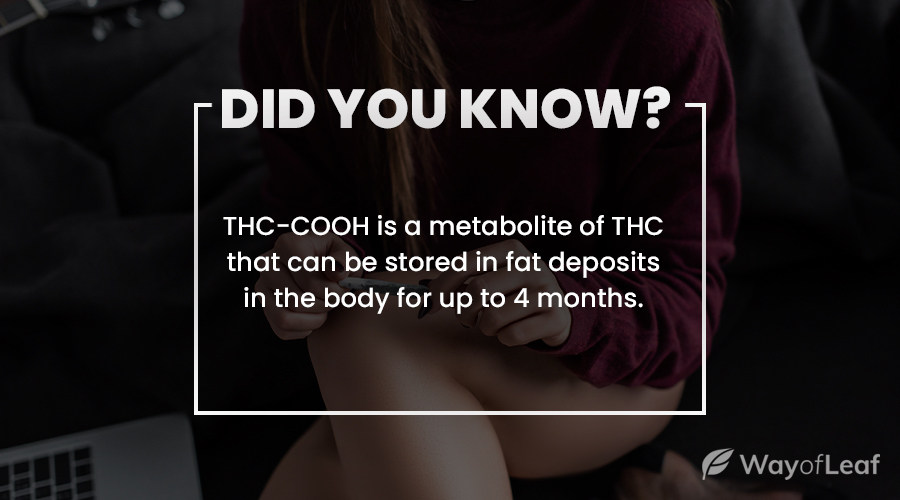
When smoking marijuana, THC enters the system almost immediately. However, if you use edibles or other consumption methods, it can take hours for THC to enter the bloodstream. Whichever consumption method you use, the result will be the same; your body metabolizes the intoxicating compounds. When they are fully broken down, you no longer feel high.
THC Leaves the Blood Relatively Quickly
Because THC is broken down pretty quickly into molecules called metabolites, it is detectable in the blood for the shortest amount of time. This is good news if you are undergoing a hematology screening, or if you need to clean your system rapidly.
When the liver breaks down THC, it forms at least 80 different metabolites. One of these is THC-COOH, which is what drug tests primarily screen for.
How long these metabolites remain in your system depends on a lot of factors. Naturally, this can make it hard to figure out how long cannabis stays in your system.
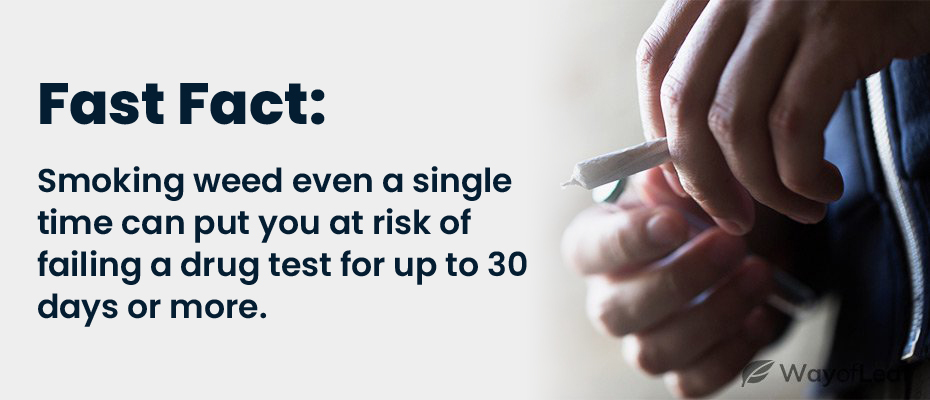
Results May Vary!
The amount of time THC stays in your system varies from person to person. Adding to the confusion, there are thousands of different marijuana strains available, and each one has different cannabinoid profiles and varying levels of THC.
In terms of chemistry, THC is lipid-soluble. It will therefore embed itself into the body’s fat tissue, meaning it is more readily stored in people with a higher body fat percentage.
This can be unfortunate for those with impending drug tests because THC is eliminated the slowest from fat tissue. It can be present for days, weeks, or even months depending on how much weed you use and how frequently you use it.
The difference between occasional users and frequent users can be vast. Frequent cannabis users retain THC metabolites for months. So, if you are frantically scouring the web for solutions to clean your system fast, you may be out of luck.
How Long Does It Take THC-COOH to Leave the Body?
On average, THC-COOH takes approximately four days to exit the body. One study looked at 52 test subjects and found the average period was 4.9 days before the body was entirely clean of THC. However, it took up to 18 days for THC-COOH to be eliminated from urine samples.
Other research found that THC stayed in the system of infrequent users for 48-72 hours. Detectable amounts were seen up to 12 days after THC exposure in more frequent users.
How Long Does Weed Stay in Your Urine?
If you’re wondering “how long does marijuana stay in your system?”, then you’re really asking how long the metabolites are detectable in urine. In other words, when searching how to flush your system efficiently, you will be aiming to clean your urine to the point where THC metabolites are no longer detectable.
Drug testing is pretty standard in companies all over the world. Plenty of employers require their workers to undergo tests to prove the absence of drugs in their system. Typically, this comes in the form of blood, saliva, or urine tests.
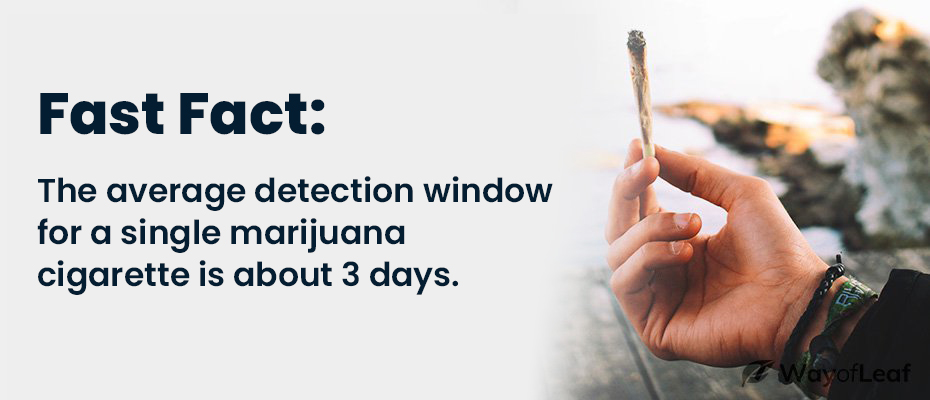
Urinalysis is the most common drug test used by employers. It’s no wonder “how to clean your urine” is one of the most frequently-searched terms online. Urine tests are favored by employers because they are relatively cheap and they have one of the longest detection periods.
Therefore, it’s essential to know how long weed can be detected in your system.
THC-COOH vs. THC: What’s the Difference?
As explained above, THC-COOH is a metabolite formed when the liver breaks down the active THC compound. If the test detects this metabolite in the urine, it means the body has processed THC relatively recently.
Here’s a general guide for how long metabolites can stay in your urine:
- Single-use (once in a 30-day period): up to 8 days
- Regular use (4-6 times over a 30-day period): up to 15 days
- Frequent use (10-15 times over a 30-day period): up to 30 days
- Heavy use (20+ times in a 30-day period): around 45-77 days
These figures are not an exact science and can vary based on numerous factors. As you can see, this is not great news for all you stoners out there wondering how to clean your system of drugs in one day.
How to Pass a Urine Test
Regular and heavy marijuana users may be concerned if they have an upcoming drug test. Between one and three months is a long time to wait, and you may need a little help to pass a urinalysis.
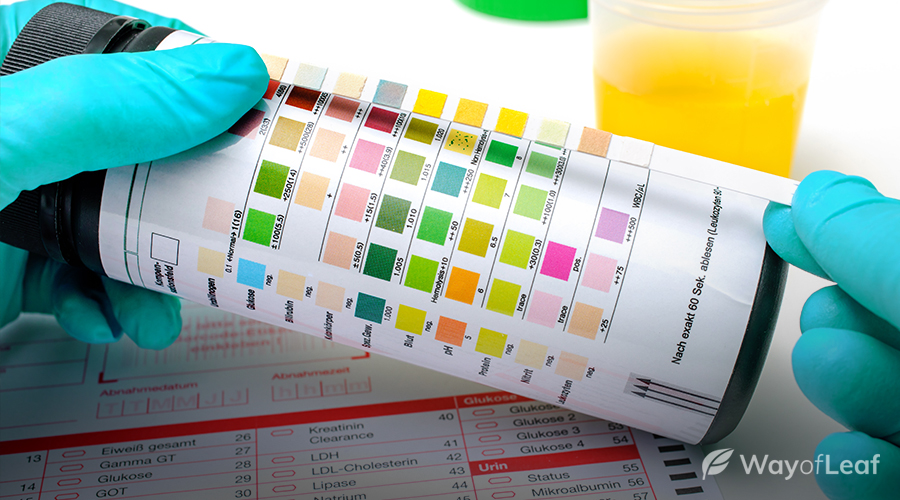
Unfortunately, there is no foolproof way to beat the system. However, there are products and methods out there that might help you, such as the following from Toxin Rid.
WAYOFLEAF’S CHOICE – TOXIN RID HOME DETOX
If you’re looking for the best combination of price, effectiveness, quick results, and at-home convenience, our review team unanimously decided on the range of Toxin Rid Home Detox products. Their range is easy to use and was more effective than nearly any other DIY detox product we tried.
Detox pills and drinks are widely available these days and are a relatively decent solution for cleaning your system.
For the specific purpose of cleaning your urine to eliminate THC metabolites, you can also try drinking excessive amounts of water to dilute your urine. However, you should note that this is rarely effective, and screeners can often tell that you have made an attempt to cover your tracks.
What About Fruit Pectin for Urine Drug Tests?
Another common method to pass a urine test is the fruit pectin method. Fruit pectin is a starch derived from the cell walls of produce; it’s often found in jams and preserves. This method involves mixing fruit pectin with an electrolyte drink like Gatorade, then consuming it at least two hours prior to a urine test. Some instructions also require you to take the concoction a day or two before as well.
After drinking the Gatorade/pectin mixture, you should follow up with a bottle or two of water and B vitamins. The theory behind this method is that, because pectin is a naturally occurring fiber, it makes the THC exit the body through the bowels and not the urine.
It’s nevertheless important to remember that detox methods do not work 100% of the time.
Nothing Is a Guarantee…
While the above methods have the potential to help you pass a urine test, none of them are guaranteed to be effective. Even if you follow all the directions to a T, you may still fail your test.
Moreover, some detox methods could make you sick due to their ingredients. Some detox options posted in online forums are outright dangerous, too. Even drinking too much water can be fatal if you aren’t careful.
If you are aware of an upcoming drug test and are concerned about your job, your best bet would be to reduce – or even abstain from – marijuana consumption.
Want to learn more about passing a urine test? Check out the best ways to pass weed urine and blood screens.
How Long Does It Take for Marijuana to Get out of Your System?
As mentioned above, there are numerous complex factors that determine how long weed is detectable in the system. Primarily, this is how frequently someone smokes, how much they smoke, and how long they have been smoking.
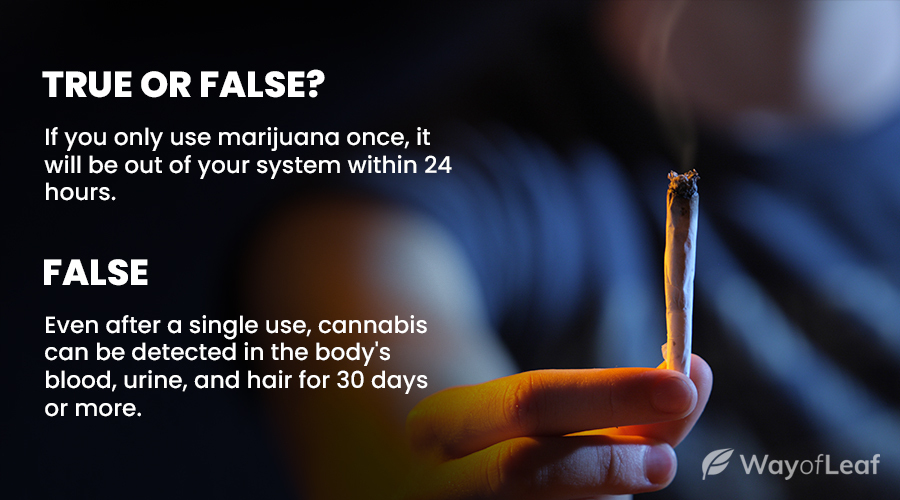
Here are a few other factors that could affect how long it takes marijuana to leave your system:
- Body fat content: The metabolites from THC are stored in fat cells. Thus, the higher your body fat percentage, the longer cannabis can stay in your system.
- Metabolism: An individual’s metabolism can also affect the rate at which the body can eliminate cannabis. It will also affect body fat content, which further influences cannabinoid detection.
- Drug strength: Different strains have different potencies; the stronger the strain, the higher the concentration of THC. This could result in more metabolites, which may take longer to eliminate.
How Long Does THC Stay in Your Saliva?
For those asking, “how long does weed stay in your saliva?”, you first need to determine how long the THC has been present.
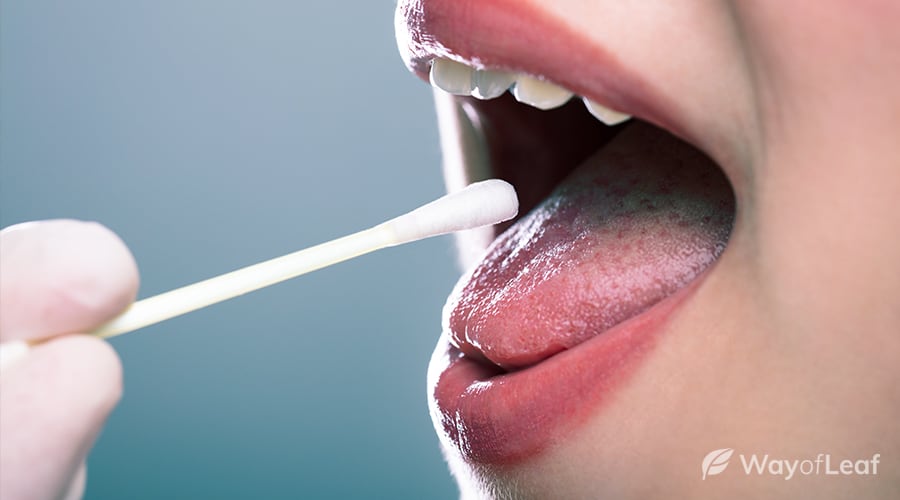
Typically, THC is detectable for the least amount of time in saliva. This is excellent news for those set to undergo a saliva test. Coincidentally, this is a popular method used by traffic police.
THC metabolites can be detected in the saliva for about an hour after smoking, and may remain for up to 24 hours. This is true even for a single smoking session. For regular smokers, this number could be closer to 72 hours. Heavy smokers are advised to wait at least a week before taking a saliva test, because THC could accumulate in the saliva glands over time.
Check out our detailed guide: How Long Does Weed Stay in Your Saliva?
How Long Does Weed Stay in Your Hair?
It is actually believed cannabis has the longest detection window in hair. In fact, the hair drug test was developed to identify long-term users rather than one-time or infrequent users. Standard hair tests typically look for drugs used over the last 90 days.
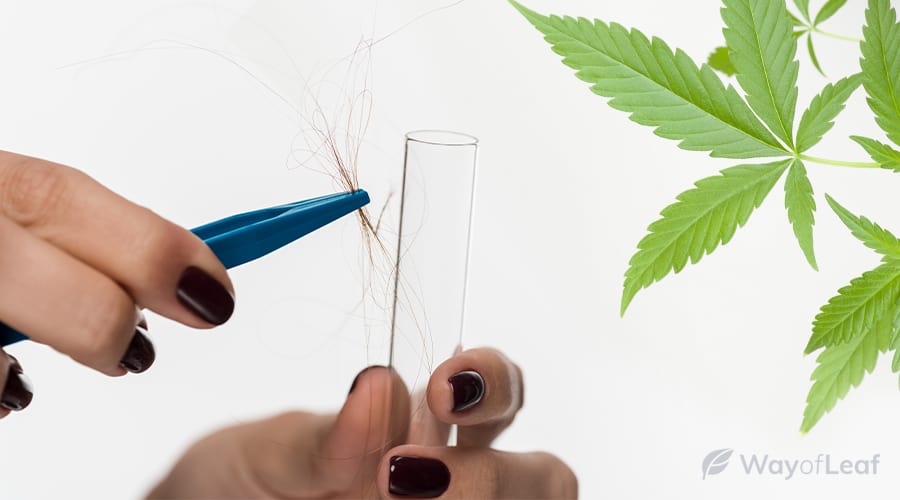
So, how long does marijuana stay in your hair? Generlaly speaking, metabolites can be detected in the hair for up to seven days after consumption. Like other tests, hair follicle tests look for the presence of THC-COOH rather than THC itself.
First-time users and infrequent users are much less likely to test positive for weed from a hair follicle test. It takes a decent amount of consumption for cannabis metabolites to reach hair follicle tissue.
Want to know more about how long marijuana stays in your hair? Read our updated THC and Hair Guide.
How Long Does Weed Stay in Your Blood?
In order to determine how long weed stays in the blood, we need to look at the THC element and its metabolites. Blood tests are not a common method, but they do take place.
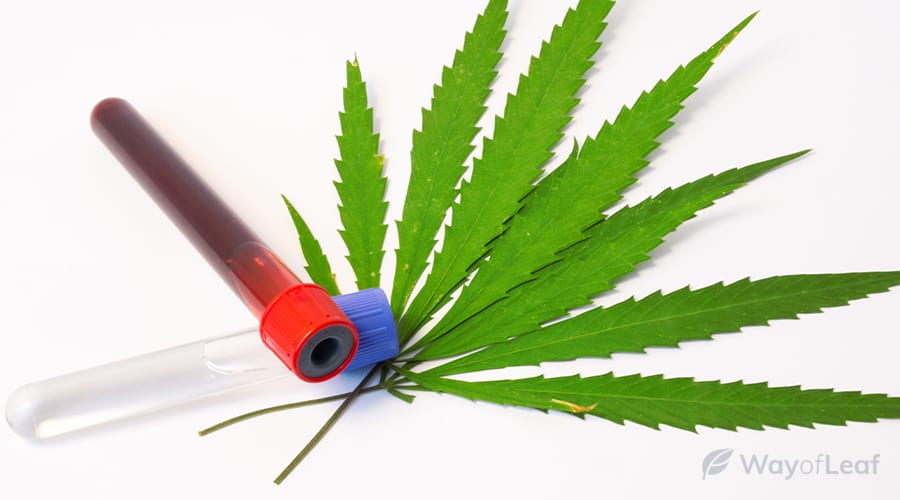
The good news is that cannabinoids prefer fat cells to reside in rather than the bloodstream. Thus, THC and its metabolites don’t stay in the blood for long. First-time and infrequent users can show up in the blood for up to 24 hours after consumption. In more frequent and regular users, it can appear for three days up to a week.
In general, you don’t need to worry too much about blood tests if you use cannabis. They are a rarity, and as long as you have enough warning to “prepare” for the screening, you should be okay.
Final Thoughts on How Long Weed Stays in the System
While this article has given insight and guidelines that have hopefully answered most of your questions regarding how long weed stays in your system, it is difficult to give an exact answer. As we have seen, there are a number of factors that can affect the outcome – the most obvious of which is the frequency of use.
If you are a newbie or a “now-and-then” kind of consumer, you should have minimal concern since the length of time that weed will stay in your system is a lot lower. Here is a quick general recap of everything we’ve covered in the form of a table:
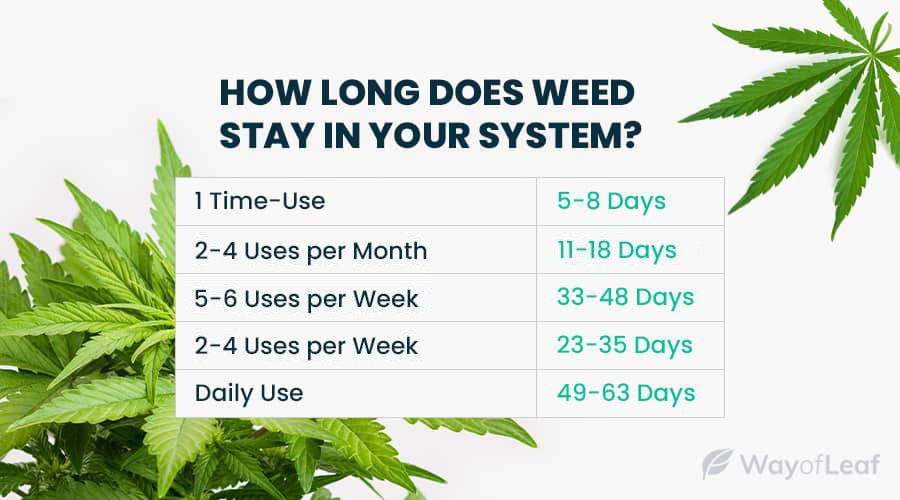
The type of drug test you undergo will have a major impact on whether or not you test positive. For example, a urine test will show weed in your system for a longer period of time than a blood test. If you are seriously concerned (and/or the thought of drug testing makes you anxious), your best bet is to hold off on consumption. Or at the very least, minimize your weed intake for the time being. After all, it’s impossible to know exactly how long weed will show up in your system.
And lastly, it’s important to note that this article has been composed only as a GENERAL GUIDELINE. It is by no means 100% “scientifically” accurate, and certainly is not a guarantee that you’ll pass a drug test — even if you follow one of the above recommendations. Keep in mind that everyone’s biochemistry is different, and thus outcomes will differ from person to person.
LOOKING FOR THE QUICKEST FIX POSSIBLE?
Check out some of the best-rated products of this year for helping to pass a drug test.
Want to know how long THC can stay in your system? Try out our THC Drug Test Calculator:
Review by Daniel J Isaacman, M.D.
Another very comprehensive review from the people at WayofLeaf. This article helps the reader understand how drug testing is performed, the difference between tests involving saliva, blood, and urine, and the various factors that affect how long a given test can test positive following usage. A few key take-home summary points for the reader:
- There is great variability in the length of time a given test will remain positive. One should never assume that the “short end” of the given time period will be adequate.
- Frequent users will tend to stay positive for longer periods of time than occasional users. This is due to “build up” and storage of THC metabolites within the body.
- The greater the fat content of one’s body, the greater the potential for THC and its major metabolite THC-COO to hang around.
If one expects to be drug tested for an important reason in the near future, the best bet is to refrain for several weeks to months before the given testing. The longer, the better, in my opinion. One must remember that the repercussions of a positive drug test can be quite damaging.




![How to Pass a Drug Test Today [5 Hacks]](https://wayofleaf.com/wp-content/uploads/2019/08/wol-banner-how-to-pass-a-drug-test-640x225.jpg)
![What Is Powdered Urine? [Does It Really Work?]](https://wayofleaf.com/wp-content/uploads/2019/06/wol_what-is-powdered-urine-640x225.jpg)


![The Stuff Detox Review [UPDATE]](https://wayofleaf.com/wp-content/uploads/2019/06/mj_the-stuff-detox_1920-640x225.jpg)



